Copyright 2004 Berkeley Breathed All rights reserved. No part of this book may be reproduced in any form or by any electronic or mechanical means, including information storage and retrieval systems, without permission in writing from the publisher, except by a reviewer who may quote brief passages in a review. Little, Brown and Company Hachette Book Group 237 Park Avenue, New York, NY 10017 Visit our Web site at www.HachetteBookGroup.com First eBook Edition
Bloom County, Outland, and Opus are syndicated by the Washington Post Writers Group.
Secondhand Lions art 2003 New Line Cinema, images used with permission. The characters and events in this book are fictitious. Any similarity to real persons, living or dead, is coincidental and not intended by the author.
ISBN: 978-0-316-05010-4 The Warner Books name and logo are trademarks of Hachette Book Group, Inc. To Jody, Sophie, and Milo Also by Berkeley Breathed Flawed DogsEdwurd Fudwupper Fibbed BigThe Last BasselopeRed Ranger Came CallingGoodnight OpusA Wish for Wings That Work I submit this primordial 1981 Bloom County Sunday panel as a candidate for my Big Twilight Zone Destiny-Messing Moment. 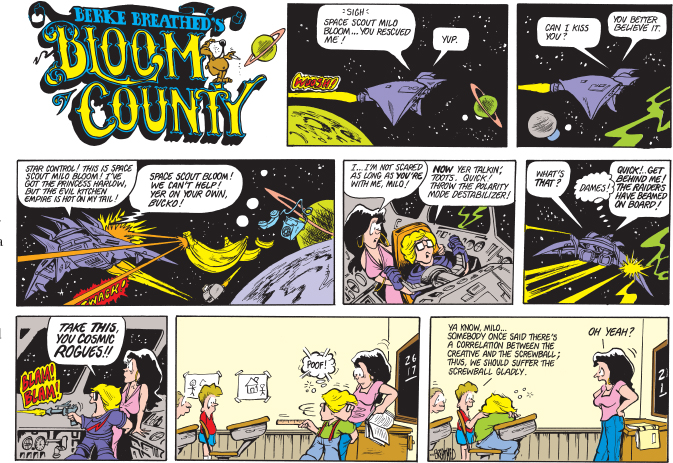 You'll note that it features a little blond-haired boy with an over-tweaked imagination working out his real-life anxieties and passions via space hero fantasies. Now that's a ripping Good Idea to build a classic comic strip around! So naturally I only drew this one panel. Most new comic strips don't survive such epic blunders. And Bloom County may well have headed for oblivion if in the following week I hadn't also drawn a mumbling penguin sitting on an ottoman watching TV.
You'll note that it features a little blond-haired boy with an over-tweaked imagination working out his real-life anxieties and passions via space hero fantasies. Now that's a ripping Good Idea to build a classic comic strip around! So naturally I only drew this one panel. Most new comic strips don't survive such epic blunders. And Bloom County may well have headed for oblivion if in the following week I hadn't also drawn a mumbling penguin sitting on an ottoman watching TV.
Mister Rogers asked his viewing tykes if they could say the word tuba player and Opus replied, tuphlem grdlphump, and Mister Rogers said, Good! In 1981, this somehow was very funny. (And Michael Jackson was notyet. A savage, backward era.) So there it is: a bird was my Other Good Idea. More odd than good, really. This one almost slipped by too, but the fansinfinitely wise if not patientlet me know immediately. Opus stayed on his ottoman.
Five years later Bill Watterson's Calvin, aka Spaceman Biff, rocketed gloriously into America's Funny Papers, which was just how the comic universe was meant to be. Yet I came close to preempting Watterson with what surely would have become dreary space adventures of Milo battling Dukakis and Donald Trump aliens. 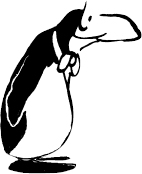 Like a toddler who imagines bouncing his ball into a freeway, I secretly love contemplating this pop culture pileup. Two decades and 784 Sunday panels later, Opus still waddles among us. I built this retrospective collection around my favorite Sunday panels simply because they're the most fun. It's an immense pleasure to see them reproduced clear and sizable for once.
Like a toddler who imagines bouncing his ball into a freeway, I secretly love contemplating this pop culture pileup. Two decades and 784 Sunday panels later, Opus still waddles among us. I built this retrospective collection around my favorite Sunday panels simply because they're the most fun. It's an immense pleasure to see them reproduced clear and sizable for once.
It's been a long, strange trip for this complicated penguin. Thanks for being along for the continuing ride. 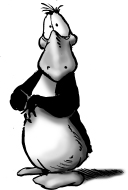
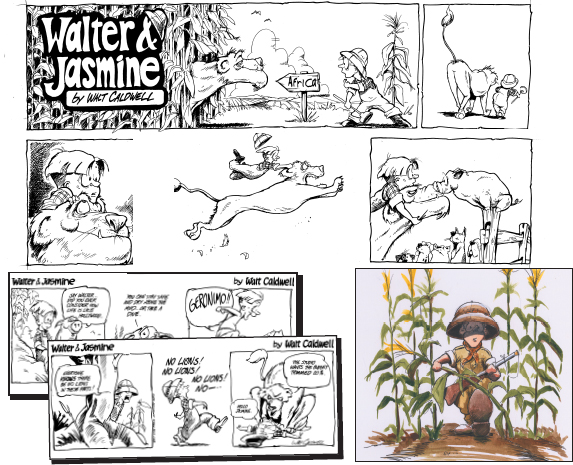
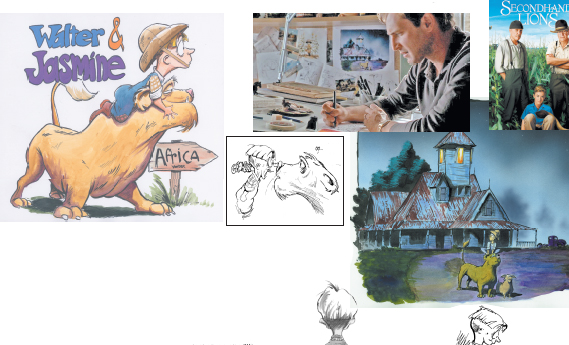 Director Tim McCanlies called me in 2003 and described a movie called Secondhand Lions that he'd written and was presently filming in Texas about an adolescent boyplayed by Haley Joel Osmentgoing to live with two crazy uncles, played by Michael Caine and Robert Duvall. At the end, the boy has become a cartoonist (where all coming-of-age movies should go), and his comic strip, Walter and Jasmine, stars the characters from his past. Tim asked if I would draw the cartoon art that was to be hanging around the walls of the set. It'd been years since I'd sat at my cartooning table, so I thought it might be fun to invent a wholly fraudulent comic strip.
Director Tim McCanlies called me in 2003 and described a movie called Secondhand Lions that he'd written and was presently filming in Texas about an adolescent boyplayed by Haley Joel Osmentgoing to live with two crazy uncles, played by Michael Caine and Robert Duvall. At the end, the boy has become a cartoonist (where all coming-of-age movies should go), and his comic strip, Walter and Jasmine, stars the characters from his past. Tim asked if I would draw the cartoon art that was to be hanging around the walls of the set. It'd been years since I'd sat at my cartooning table, so I thought it might be fun to invent a wholly fraudulent comic strip.
The film was terrific and I heard from a surprising number of people who recognized my hand in the art. Why is it here? Because if I hadn't had so much fun drawing these fake comics, it would never have occurred to me soon afterward that I should be drawing the real thing again. Life imitating art, as it should be. 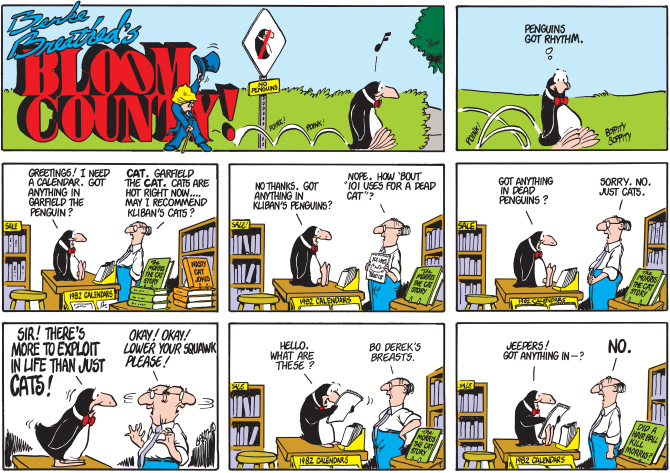 It's teeth-clenchingly obvious, but I'd like to point out the dramatic evolution of Opus from his first appearance to his present-day incarnation. Both in physical form and personality, he's been relentlessly evolving. I'm not sure that the Opus of today would recognize his scrawny 1981 version there on the left.
It's teeth-clenchingly obvious, but I'd like to point out the dramatic evolution of Opus from his first appearance to his present-day incarnation. Both in physical form and personality, he's been relentlessly evolving. I'm not sure that the Opus of today would recognize his scrawny 1981 version there on the left.
Inversely, I suspect the early Opus would have an hysterical fit if he were to see where his nose ends up. I've had nothing to do with this. At least not my conscious self. This relentless march of Darwinian adaptation isn't necessarily a virtue for a comic strip. Readers seem to view changes in their favorite strips as they would changes in their plumbing: discomforting. But in my case, swinging wildly for the next creative hill is as natural (and irresistible) as breakdancing with my four-year-old in a Denny's.
People around me squirm but I'm helpless to do anything about it. As I'm intensely private, I resent that the only way I seem to be able to do this job is to make the writing personal. I'm scattered transparently throughout these characters. On a certain level, I'd be less embarrassed if I did a strip like Marmaduke, where people could only make conjectures about my dog's personal life rather than mine. But alas, since life isn't standing still for me, I fear it won't for a small penguin. 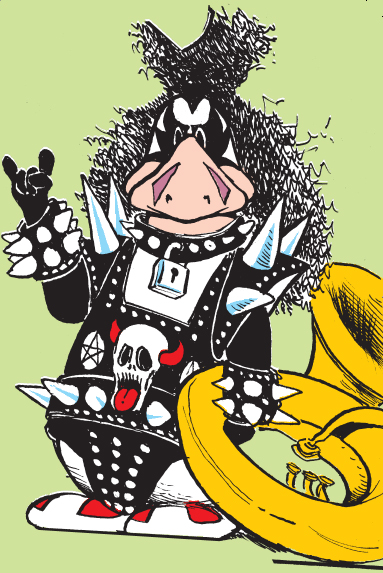
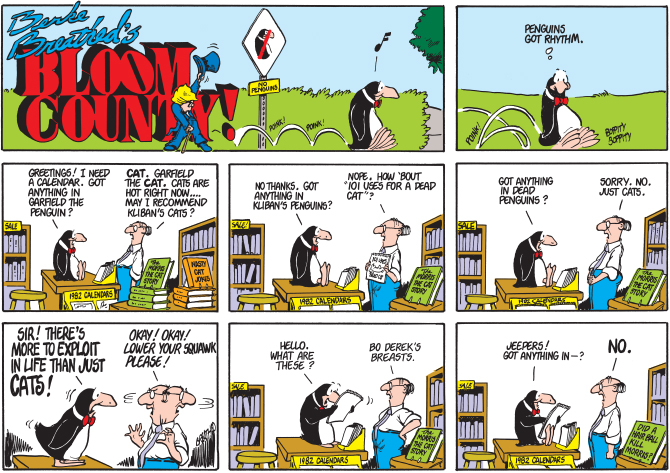
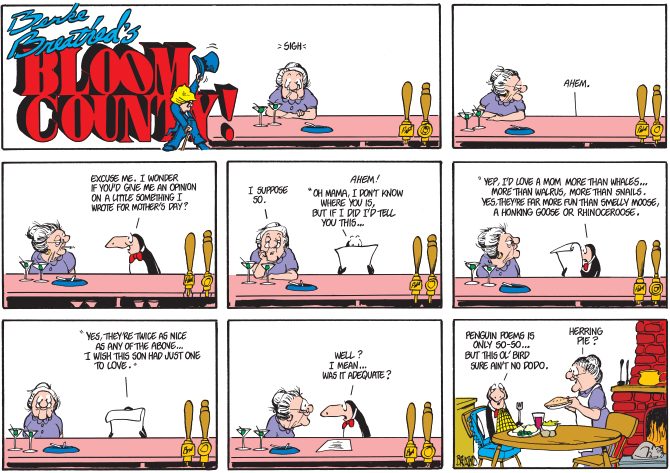
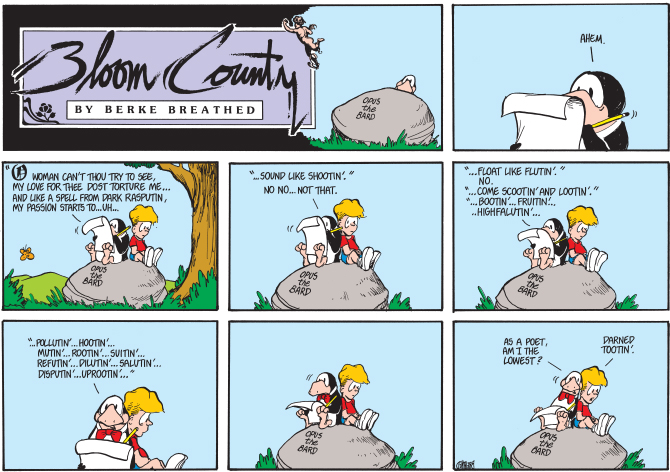
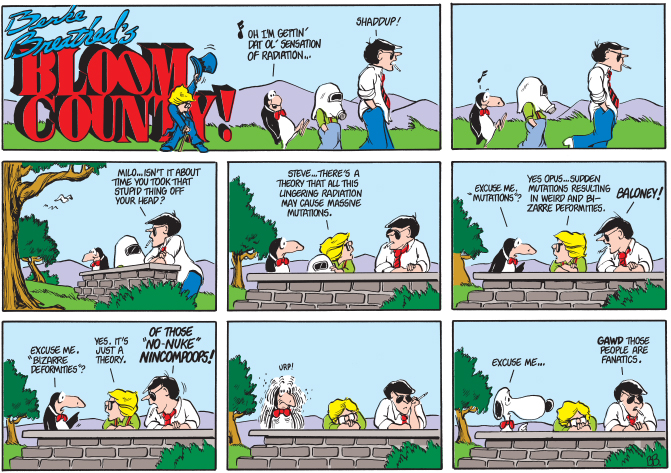
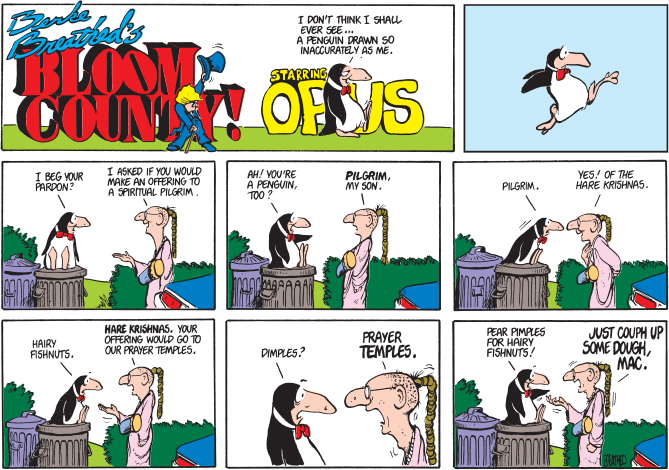
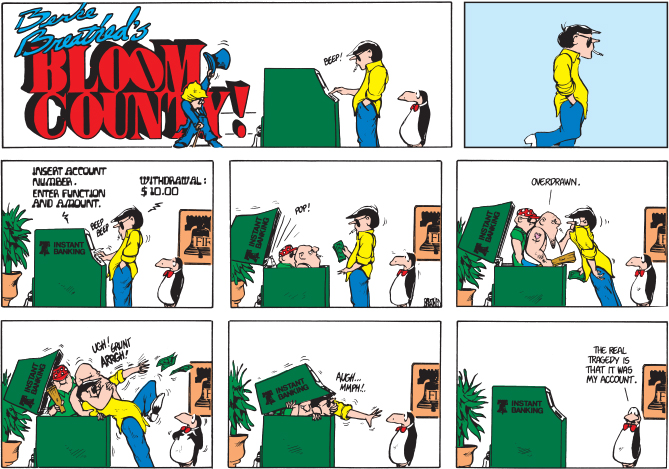
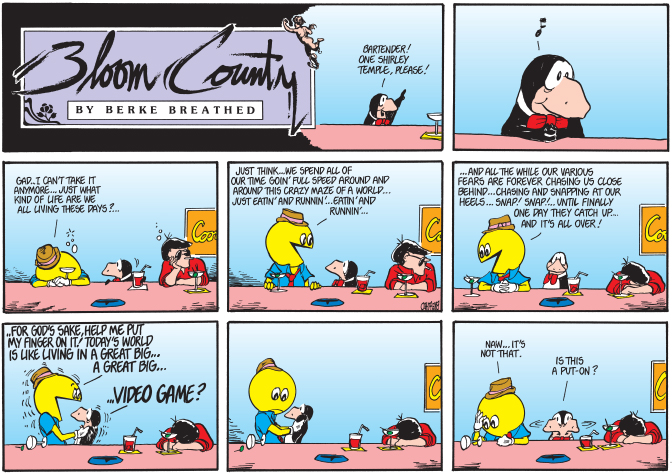
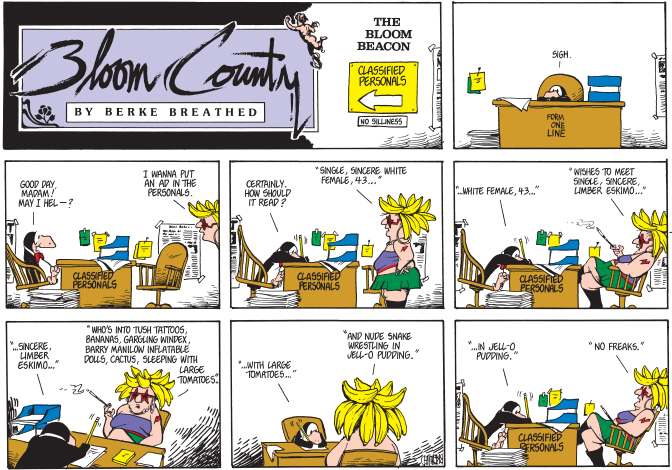
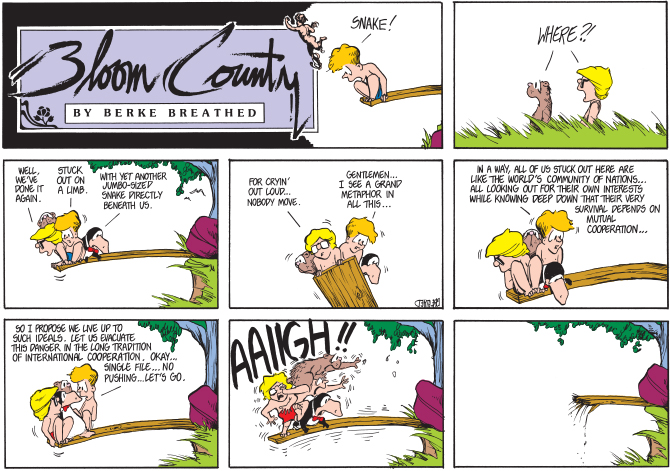
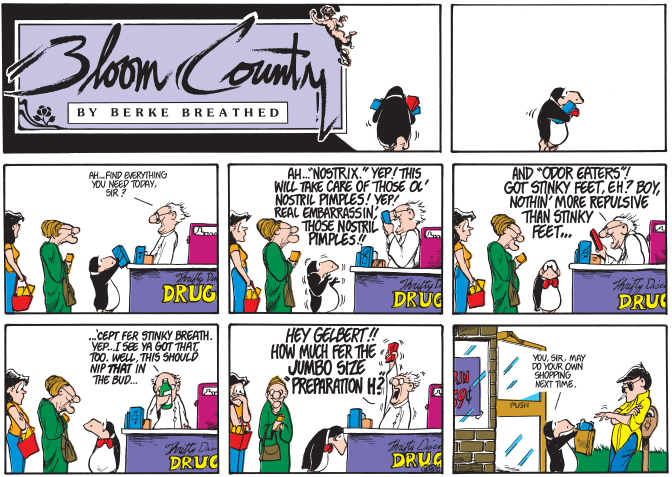
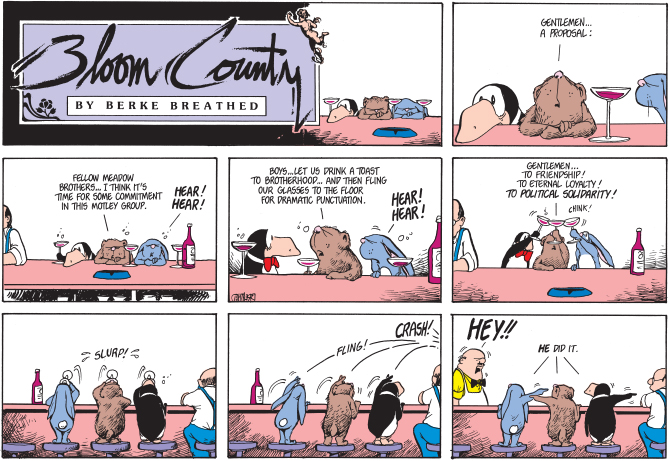




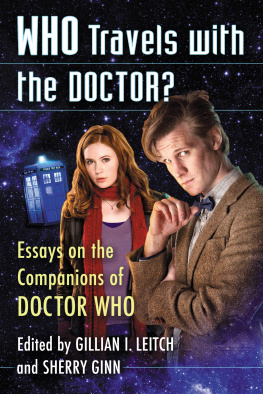
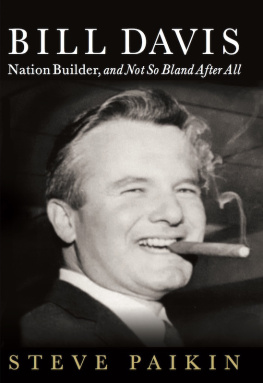
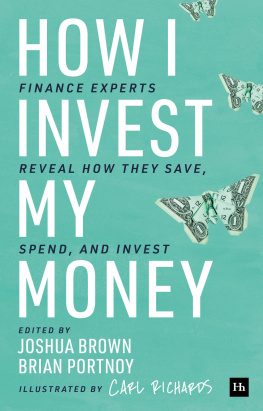
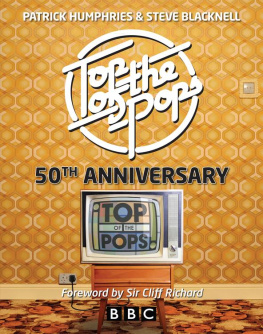
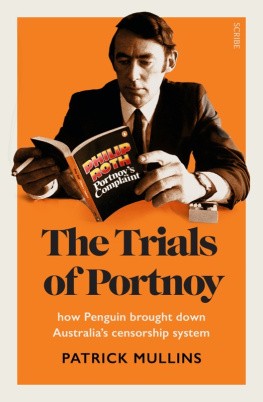

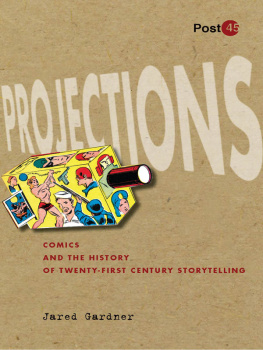
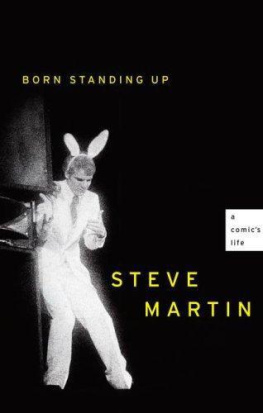
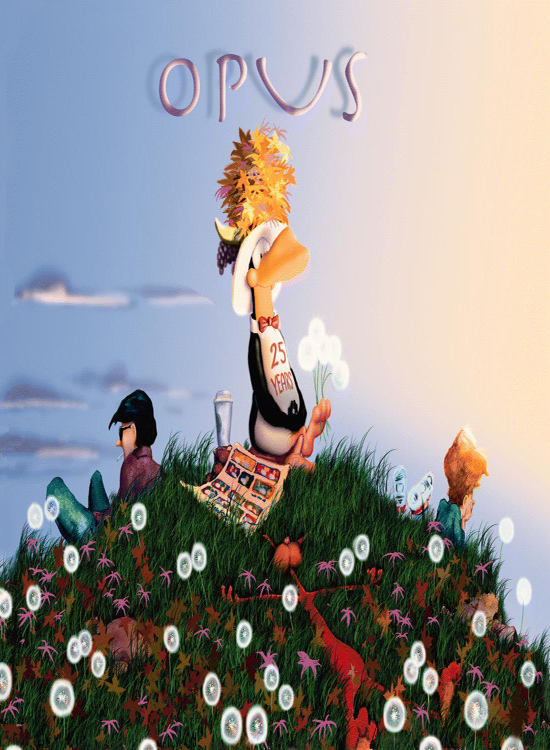
 You'll note that it features a little blond-haired boy with an over-tweaked imagination working out his real-life anxieties and passions via space hero fantasies. Now that's a ripping Good Idea to build a classic comic strip around! So naturally I only drew this one panel. Most new comic strips don't survive such epic blunders. And Bloom County may well have headed for oblivion if in the following week I hadn't also drawn a mumbling penguin sitting on an ottoman watching TV.
You'll note that it features a little blond-haired boy with an over-tweaked imagination working out his real-life anxieties and passions via space hero fantasies. Now that's a ripping Good Idea to build a classic comic strip around! So naturally I only drew this one panel. Most new comic strips don't survive such epic blunders. And Bloom County may well have headed for oblivion if in the following week I hadn't also drawn a mumbling penguin sitting on an ottoman watching TV. Like a toddler who imagines bouncing his ball into a freeway, I secretly love contemplating this pop culture pileup. Two decades and 784 Sunday panels later, Opus still waddles among us. I built this retrospective collection around my favorite Sunday panels simply because they're the most fun. It's an immense pleasure to see them reproduced clear and sizable for once.
Like a toddler who imagines bouncing his ball into a freeway, I secretly love contemplating this pop culture pileup. Two decades and 784 Sunday panels later, Opus still waddles among us. I built this retrospective collection around my favorite Sunday panels simply because they're the most fun. It's an immense pleasure to see them reproduced clear and sizable for once.

 Director Tim McCanlies called me in 2003 and described a movie called Secondhand Lions that he'd written and was presently filming in Texas about an adolescent boyplayed by Haley Joel Osmentgoing to live with two crazy uncles, played by Michael Caine and Robert Duvall. At the end, the boy has become a cartoonist (where all coming-of-age movies should go), and his comic strip, Walter and Jasmine, stars the characters from his past. Tim asked if I would draw the cartoon art that was to be hanging around the walls of the set. It'd been years since I'd sat at my cartooning table, so I thought it might be fun to invent a wholly fraudulent comic strip.
Director Tim McCanlies called me in 2003 and described a movie called Secondhand Lions that he'd written and was presently filming in Texas about an adolescent boyplayed by Haley Joel Osmentgoing to live with two crazy uncles, played by Michael Caine and Robert Duvall. At the end, the boy has become a cartoonist (where all coming-of-age movies should go), and his comic strip, Walter and Jasmine, stars the characters from his past. Tim asked if I would draw the cartoon art that was to be hanging around the walls of the set. It'd been years since I'd sat at my cartooning table, so I thought it might be fun to invent a wholly fraudulent comic strip. It's teeth-clenchingly obvious, but I'd like to point out the dramatic evolution of Opus from his first appearance to his present-day incarnation. Both in physical form and personality, he's been relentlessly evolving. I'm not sure that the Opus of today would recognize his scrawny 1981 version there on the left.
It's teeth-clenchingly obvious, but I'd like to point out the dramatic evolution of Opus from his first appearance to his present-day incarnation. Both in physical form and personality, he's been relentlessly evolving. I'm not sure that the Opus of today would recognize his scrawny 1981 version there on the left.










